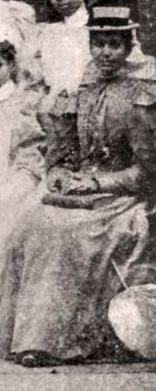Lucy Hughes Brown facts for kids
Lucy Hughes Brown (born April 12, 1863 – died June 26, 1911) was an amazing African-American woman. She was the very first Black woman doctor allowed to practice medicine in both North Carolina and South Carolina. She also helped start a nursing school and a hospital. Besides being a doctor, Lucy Hughes Brown was an activist who worked for change and a talented poet.
Early Life and Learning
Lucy Manetta Hughes was born in Mebane, North Carolina on April 12, 1863. She was an orphan, meaning she didn't have parents. She went to Scotia Seminary in Concord and finished her studies there in 1885. At Scotia Seminary, she met Sarah Dudley Pettey. Sarah helped Lucy get involved in activism, which means working to make society better.
Lucy then decided to study medicine. She went to the Woman's Medical College of Pennsylvania. In 1894, she earned her medical degree. There were 52 women in her graduating class. In 1896, she also attended a conference in Washington D.C. as a representative for the National Federation of Afro-American Women. This group worked to improve the lives of African-American women.
Her Poetry
After finishing at Scotia Seminary, Lucy Hughes started writing poems. Two of her most well-known poems are called "Thoughts on Retiring" and "A Retrospective."
Her Medical Career
In May 1894, Lucy Hughes Brown received her license to practice medicine in North Carolina. She was one of only three women to get a license that year. This made her the first African-American woman to be a licensed doctor in North Carolina.
Dr. Brown worked in Wilmington, North Carolina for two years. Then, in 1896, she and her husband moved to Charleston, South Carolina. There, she also became South Carolina's first African-American woman doctor. By 1900, she lived in Charleston and advertised her medical services in the local newspaper.
In 1897, Dr. Hughes Brown teamed up with other Black professionals, including Dr. Alonzo Clifton McClennan. Together, they started the Canon Hospital and Training School for Nurses. At this school, she taught important subjects like Obstetrical Nursing (caring for mothers during childbirth) and how to care for babies. She was in charge of the nursing department and its training program. The first nurses graduated from their program in 1898.
Dr. Brown also helped edit the Hospital Herald. This was the first medical newspaper for Black doctors in South Carolina, started in 1898. In 1902, a well-known British nursing journal recognized her as a leader in her field in South Carolina. Lucy Hughes Brown passed away in Charlotte on June 26, 1911.
Her Family Life
In 1889, Lucy Hughes married David Brown. He was a clergyman, which is a religious leader, and a teacher. Dr. Hughes Brown moved to South Carolina because of her husband's job. Reverend Brown became the principal of Wallingford Academy. This school was created in 1865 for African Americans by a minister from the Zion Presbyterian Church. When Dr. Hughes Brown died, her family had moved to Charlotte, North Carolina. There, Reverend David Brown taught at Biddle University, which was a Presbyterian school for boys.
 | Janet Taylor Pickett |
 | Synthia Saint James |
 | Howardena Pindell |
 | Faith Ringgold |


